2022 Symposium
Meeting the Moment
Progress & Potential in a Changing Global Health Landscape
December 7 – 8
Schedule
Moderator: Elisha Dunn-Georgiou, President and CEO | Global Health Council
Speakers:
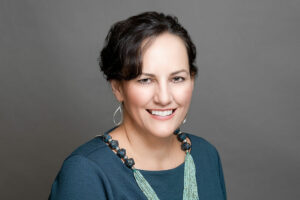
Mary Beth Goodman, Coordinator, Global COVID-19 Response and Health Security | U.S. Department of State
Mary Beth Goodman serves as the Coordinator for Global COVID Response and Health Security for the U.S. Department of State. Ms. Goodman is an international development and anti-corruption policy expert who has worked with governments, civil society organizations, the private sector, and international institutions to advance global development, human rights, and social justice. She served as the Special Assistant to President Obama and Senior Director for Development, Democracy and Humanitarian Affairs at the White House, where she was responsible for advising the President and National Security Advisor on a wide range of issues.
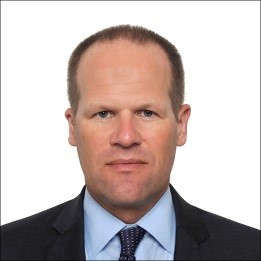
Eric Meyer | United States Department of the Treasury
Eric Meyer is Deputy Assistant Secretary for Africa and the Middle East at the U.S. Department of the Treasury. In this role he oversees Treasury’s engagement with 59 economies across Africa and the Middle East, including economic and financial sector monitoring, analysis and policy advice, and development policy work. In his over 20 years with Treasury, Eric has worked on a range of development, environment, private sector, and regional economic issues. He has served as Deputy Assistant Secretary for International Development Policy, in the U.S. Executive Director’s offices at the IMF, World Bank and EBRD, as well as covering Europe as Treasury Representative based in Frankfurt. As Acting Deputy Assistant Secretary and Director for Europe and Eurasia, Eric coordinated the Department’s engagement with, and response to, financial and economic crises across Europe between 2006 and 2010. Prior to joining the Treasury Department, Eric worked in international consulting and construction management in Atlanta. He earned degrees in Foreign Service from Georgetown University and International Economics and Energy and Environment Policy from the Johns Hopkins University – School of Advanced International Studies.
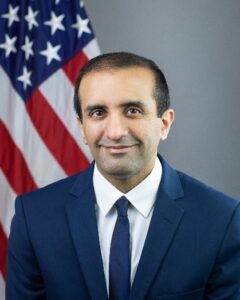
Dr. Raj Panjabi | United States National Security Council
Recognized by TIME as one of the 100 Most Influential People in the World, Dr. Raj Panjabi is a physician, professor, epidemiologist, entrepreneur and public servant. Dr. Panjabi currently serves as Special Assistant to the President and Senior Director for Global Health Security and Biodefense at the White House National Security Council.
Previously, Dr. Panjabi was appointed by President Biden as the 3rd U.S. Global Malaria Coordinator to head the President’s Malaria Initiative (PMI), led by the U.S. Agency for International Development (USAID) and co-implemented with the Centers for Disease Control (CDC) and Prevention. As the President’s Malaria Coordinator, he managed an annual budget of $770 million and over 200 USAID and CDC staff to protect hundreds of millions of people at risk of malaria across nearly 30 countries representing 80% of the global malaria burden in Asia and Africa. Panjabi was the first Asian American and first person born in Africa, where malaria is endemic, to serve in the role. During Panjabi’s tenure, PMI launched a $6 billion strategy aimed at ending malaria within a generation by helping save four million lives, prevent one billion cases and introducing initiatives to help rollout the world’s first malaria vaccine, strengthen community health workforces, and expand partnerships with local institutions. He also served on the executive leadership team at the USAID Bureau of Global Health and on the U.S. constituency to the Board of the Global Fund for AIDS, Tuberculosis and Malaria, which helped lead the global response to COVID-19.
Prior to serving in the Biden-Harris Administration, Dr. Panjabi served as CEO of Last Mile Health, an award-winning non-profit organization he co-founded in 2007 to save lives in the world’s most remote communities. Panjabi has authored or co-authored over 80 publications in the scientific and popular press. He received a medical degree from the University of North Carolina, trained in internal medicine and as a clinical fellow at Massachusetts General Hospital and Harvard Medical School, received a Master of Public Health in epidemiology from Johns Hopkins University as a Sommer Scholar, and served as visiting faculty at Harvard Kennedy School of Government’s Social Innovation and Change Initiative. Dr. Panjabi currently lives in the Washington, DC area with his family.
Priya Basu | World Bank
Priya Basu is the Executive Head of the Secretariat for the newly established Pandemic Fund, hosted by the World Bank. Priya has also been serving as head of the Secretariat for the COVID-19 task force and leading the World Bank’s engagement on pandemic prevention, preparedness and response in global fora, including the G20 and G7 – coordinating across finance and health. With a career in development finance spanning three decades, Priya brings a depth and breadth of experience in country operations across world regions, resource mobilization, and leading and driving large and complex multi-stakeholder initiatives and agreements at the global level to support global public goods.
Other speakers TBC.
This discussion will examine the state whole of workforce from R&D to delivery and outreach – required to deliver global health security – and discuss potential concrete pathways for a more integrated advocacy agenda. Speakers will include technical, delivery, government, and advocacy leaders.
Moderator:
Vince Blaser, Sabin Vaccine Institute
Panelists:
Dr. Naveen Thacker, International Pediatric Association
Professor Petro Terblanche, Afrigen Biologics
Stacey Knobler, Sabin Vaccine Institute
Dr. Kip Baggett, U.S. Centers for Disease Control and Prevention
Respondents:
Rafiat Akinokun, Institute of Nursing Research Nigeria
Jamie Bay Nishi, Global Health Technologies Coalition
David Bryden, Frontline Health Workers Coalition, IntraHealth International
This discussion is presented by the Sabin Vaccine Institute supported by the secretariats of the Global Health Technologies Coalition and Frontline Health Workers Coalition.
This discussion will connect gender equality and health systems strengthening in the wake of the COVID-19 pandemic. Using CARE’s 2022 reports on lessons learned from COVID-19 (Women at the last mile: How investments in gender equality have kept health systems running during COVID-19 and She Told Us So (Again)), this session will showcase the centrality of women for community resilience and robust recovery from health shocks. Topics will include the importance of frontline health workers (70% of whom are women), innovative solutions to promote women’s community leadership (such as savings groups and community accountability mechanisms), and women’s health (including access to family planning services). We will center the voices closest to these issues, including technical experts as well as local women leaders who have lived experience of health and/or gender equality programs that improved their community’s health outcomes.
Moderator:
Corinne Paul, Global Health Policy Advocate | CARE
Panelists:
Stephanie Psaki, PhD, Director for Global Health Response | National Security Council
Joyce Sepenoo, Senior Director for Health Equity and Rights | CARE
Dr. Marie-Claire Wangari, MBChB, Co-Founder and Communications Director | Women in Global Health – Kenya Chapter
This conversation is presented by CARE.
As we continue to combat 21st century health threats and emerging infectious diseases, could the path to a better prepared and protected world rely on unlocking the collective power of the global community? During this session, preparedness leaders will discuss the importance of collaboration in spurring next-generation innovations for global health security. Hear from leaders from BLUE KNIGHT™, a joint initiative between Johnson & Johnson Innovation – JLABS and the Biomedical Advanced Research and Development Authority (BARDA), that supports the acceleration of a portfolio of early-stage companies around the world. Initiative leaders will be joined by two BLUE KNIGHT™ portfolio companies to discuss the potential of public-private partnerships to accelerate future health security solutions.
Moderator:
Rachel Rath, MBA, MPH, Director, BARDA Alliance | Johnson & Johnson Innovation
Panelists:
Ashim Subedee, PhD, Director, Division of Research, Innovation, and Ventures (DRIVe) Catalyst Office| Biomedical Advanced Research and Development Authority (BARDA)
Rick Pierce, CEO, Co-Founder, and Board Member | Decoy Therapeutics
Joshua Yang, MD, PhD, MBA, CEO and Co-Founder | Glyphic Biotechnologies
Christopher Pirie, PhD, Co-Founder & COO | HDT Bio
Megan Livingston, MSc, Senior Director, Business Development | Jurata Thin Film
This discussion is presented by Johnson and Johnson Innovation.
The global community is now discussing how to strengthen prevention and preparedness for the next pandemic threat. A new fund has been created at the World Bank (the FIF) and WHO is convening partners to establish a new pandemic treaty. Policy action on preparedness offers both challenges and enormous opportunities. It could lead to further siloing of global health and reduction in financing for established entities in favor of the FIF. Or it could lead to significant new investment in resilient health systems, better able to meet all people’s needs today and better able to identify and respond to new disease threats. This session will be a dynamic dialogue: 1) to explore what preparedness that strengthens health systems would look like and how it might work, including lessons from COVID-19, and, 2) the policy implications for the FIF, Global Fund and bilateral and national health programs.
Moderator: Chris Collins, President & CEO | Friends of the Global Fight Against AIDS, Tuberculosis and Malaria
Panelists:
Dr. Benjamin Djoudalbaye, Head, Division of Policy, Health Diplomacy and Communication | Africa CDC
Oanh Khuat | SCDI Vietnam
Dr. Fujita Masami
Jackie Kiarie | Amref
Fitsum Lakew Alemayehu | WACI Health
Colin Puzo Smith | Results
This discussion is presented by Friends of the Global Fight.
During this session, speakers will highlight the current state of play for multilaterals as the world transitions out of the pandemic and share how multilaterals are addressing cross-cutting issues with health.
Moderator:
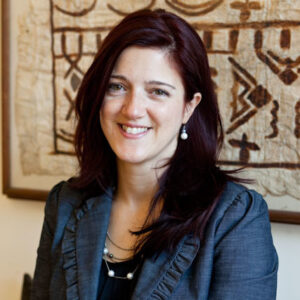
Amy Boldosser-Boesch | MSH
Amy Boldosser-Boesch has more than 20 years of experience in both global and U.S. domestic health policy and advocacy. She is currently Senior Director and Practice Area Lead for Health Policy, Advocacy & Engagement and Senior Director for Integrated Health Care at Management Sciences for Health (MSH). She oversees MSH’s work and teams dedicated to improving women’s, children’s, and adolescents’ health and person-centered primary health care and leads advocacy and accountability efforts for improved sexual, reproductive, maternal, newborn, and adolescent health and universal health coverage. She oversees the Secretariat for the Civil Society Engagement Mechanism of UHC2030, which advocates to ensure marginalized groups are not left behind in the push to achieve universal health coverage. Previously, she was interim president and CEO at Family Care International (FCI), an NGO dedicated to making pregnancy and childbirth safer in the developing world; she led the integration of FCI’s programs and staff into MSH in late 2015. Amy is a proud member of the Global Health Council Board of Directors.
Panelists:
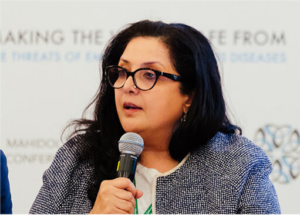
Mandeep Dhaliwal | UNDP
Dr. Mandeep Dhaliwal is the Director of UNDP’s HIV and Health Group, Bureau of Policy and Programme Support. She brings to the organization over 20 years of experience working on HIV, health, human rights and evidence-based policy and programming in low and middle-income countries. Prior to joining UNDP, she was a senior adviser to the Dutch Royal Tropical Institute’s Special Programme on HIV/ AIDS. From 2000 to 2006, Dr. Dhaliwal worked for the International HIV/AIDS Alliance’s Policy, Research and Good Practice Team in the United Kingdom where she focused on issues of HIV care and treatment in developing countries. She was instrumental in expanding the International HIV/AIDS Alliance’s technical support and policy work on issues of HIV care, treatment and support in Africa, Asia, Eastern Europe and Latin America.
Abheet Solomon | UNICEF
Mr. Abheet Solomon is the planning and partnerships lead for UNICEF’s global health programme. Based in New York, Abheet has worked with UNICEF for over 22 years in various roles across Africa, Caribbean, South Asia and North America, focusing on strategic planning, management, monitoring and evaluation of UNICEF’s programmes on maternal, newborn and child health, education, WASH and child protection. Abheet also led joint UN planning in Tanzania Delivering as One and in Suriname, in addition to monitoring results for children with regional inter-governmental entities. In his current role, Abheet is also the global programme lead for UNICEF’s Healthy Environments for Healthy Children programme which focuses on protecting children’s health from the impact of pollution and climate change.
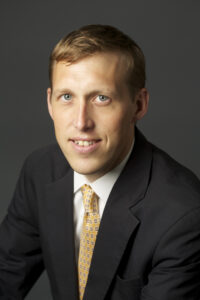
Jordie Hannum | Better World Campaign
Jordie Hannum has 20 years of legislative, analytical, and advocacy experience, including key roles on Capitol Hill, political campaigns, and within non-governmental organizations. As Executive Director of the Better World Campaign (BWC), he guides its legislative and advocacy efforts around U.S.-UN engagement and helped secure support for paying off over $700 million in arrears to the United Nations. During his tenure at the UN Foundation/BWC, Mr. Hannum has testified in front of Congress on the UN’s value, its peacekeeping operations, and U.S. standing in international organizations. He has traveled to South Sudan, DR Congo and Uganda researching civilian protection and written on the importance of U.S. engagement in peacekeeping. Stemming from his travels, Mr. Hannum has also examined how peacekeepers create conditions under which displaced persons can voluntarily return home. His writing has appeared in Foreign Policy, The Hill, Just Security, The Cipher Brief, and Devex.
Sarah Craven | United Nations Population Fund
Sarah Craven serves as Director, North American Representational Office of UNFPA, the United Nations Population Fund. Sarah is a seasoned policy advocate and attorney with experience in global health and human rights. Prior to her work at UNFPA, she held positions at the U.S. Department of State and on the legislative staff to U.S. Senators Tim Wirth and Spark Matsunaga. She served as policy a dvisor to CEDPA during the 1994 International Conference on Population and the 1995 Fourth World Conference on Women in Beijing, China. She holds a B.A. from Macalester College, a M. Phil from Cambridge University (UK) and a J.D. from Georgetown University Law Center where she was a Public Interest Law Scholar. In 2010, she was named one of Macalester College’s Distinguished Citizens.
Important new science strongly supports zoonotic origins for COVID-19. Similarly, all other viral pandemics since 1918, originally spilled over from animals into humans. Today, the repeated emergences of these zoonoses, combined with an exponential increase of international connectivity, is pushing the world into the era of pandemics. We can avoid this. But only if we take a holistic approach to pandemic prevention, aligned with the principles of One Health. It is now a scientific fact that human impact on ecosystems through deforestation and unsustainable land use, animal husbandry practices and wildlife trade, drives up the risk of zoonotic spillover. This risk can therefore be reduced. This session will bring together leaders from the public health, animal health and environmental sectors to highlight practical actions that we can take to reduce the risk of spillover and discuss the critical importance of One Health for pandemic prevention.
Moderator:
Dr. Nigel Sizer, Executive Director | Preventing Pandemics at The Source
Panelists:
Dr. Neil Vora, Pandemic Prevention Fellow | Conservation International
Dr. Jonathan Epstein, Vice President for Science and Outreach | EcoHealth Alliance
Jim Levy, Deputy Assistant Secretary for Space, Science, and Health and Director, Office of International Health and Biodefense | United States Department of State
Ashley Arabasadi, Senior Director for Global Health R&D Advocacy | Research America
This discussion is presented by Preventing Pandemics at the Source.
This panel will provide background on the global non-communicable diseases burden and the challenges that NCDs pose on communities and health systems globally while discussing why NCDs need to be a part of the USAID Vision for Health Systems Strengthening 2030 to promote access to higher quality care for the world’s most vulnerable. We will also discuss the current gaps in funding and an equitable and integrated response for NCDs and state a call to action for the U.S. and other governments and stakeholders to address NCDs in more comprehensive way.
Moderator:
Diana Vaca McGhie, Global Advocacy Director | American Heart Association
Panelists:
Marijke Kremin, Policy & Advocacy Manager | NCD Alliance
Maia Olsen, NCD Advocacy Lead | Partners in Health
Eliana Monteforte, Director of Special Projects/NCD Roundtable Co-Chair | Global Health Council
Dr. Apoorva Gomber, Type 1 Diabetes and Global Health Equity Research Fellow | Center for Integration Science, Brigham and Women’s Hospital
This discussion is presented by the NCD Roundtable.
This panel will present findings of the Economist Impact’s recently released Health Inclusivity Index and discuss the real-world implications of health inclusion, or, more pointedly, health exclusion for certain groups, namely women and people with disabilities.
Moderator:
Laura Hoemeke, DrPH, MPH | Senior Global Health Consultant
Panelists:
Erin Stieber, Chief Programs Strategy Officer | Smile Train
Dr. Roopa Dhatt, Co-Founder | Women in Global Health
David Humphreys, Global Practice Lead, Health Policy | Economist Impact
This panel is presented by Smile Train.
Over 84% of the world’s population belong to a major faith group, and faith-based organizations provide a substantial share of health services in health facilities, community-based programs, and places of worship. They are valuable partners and essential elements of local and international health strategies to address both long- and short-term global health interventions. Faith actors and institutions are, however, often overlooked or poorly understood in health sector planning and coordination. To address this, Christian Connections for International Health is the secretariat for the new Christian Health Asset Mapping Consortium, which will create a registry of known data sources and improve the quality and reporting on data about the scope and scale of faith-based health assets. This discussion will also highlight the emerging role of formal networks of health assets and emphasize how to engage them in planning and service delivery.
This workshop-style session will be led by:
Douglas Fountain, Executive Director | Christian Connections for International Health
Rebecca Waugh, Senior Programs Advisor for Faith Engagement | Christian Connections for International Health
This discussion is presented by Christian Connections for International Health.
Join us as we hear from Dr. Denise Cardo, Acting Director of the Center for Global Health at the Centers for Disease Control and Prevention.
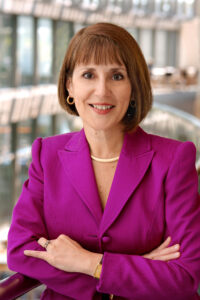
Dr. Denise Cardo is the Acting Director for the Center for Global Health (CGH) at the Centers for Disease Control and Prevention (CDC) since August 2022. Dr. Cardo joined CDC in 1993 as a medical epidemiologist and, after holding several leadership positions in the Division of Healthcare Quality Promotion (DHQP), National Center for Emerging and Zoonotic Infectious Diseases, she was selected as division director in 2003. Dr. Cardo has led CDC activities to prevent infections and antimicrobial resistance in healthcare settings, sepsis, and to promote healthcare safety in the United States and globally. She has been involved in several CDC responses to emerging infection threats, including to COVID-19. In addition, she has served in other CDC leadership roles, including as the CDC Acting Deputy Director for Surveillance, Epi and Lab systems (OSELS) and CDC Acting Deputy Director for Infectious Diseases (DDID).
Prior to joining CDC, she had a distinguished career in the division of infectious diseases at one of Brazil’s prestigious medical institutions, Escola Paulista de Medicina, where she received her medical degree, completed her residency and fellowship, and joined the faculty as associated professor of infectious diseases.
She is the author of several research and reviewed papers including book chapters and has received several awards for her work.
In partnership, Ipas and WEC will bring leaders from the green wave movement to the 2022 Global Health Landscape Symposium to exchange insights and experiences with their colleagues. This session will start off with a panel presentation, followed by a Q and A, and then small group work. Participants will be provided with scenarios and key questions to foster a rich dialog on key learnings from the abortion rights movement globally. This session will be focused on shared learning and partnership building transnationally. In the last two years, Argentina, Mexico and Colombia, have decriminalized or fully legalized abortion. While, so much was achieved in these recent years, these were hard-fought wins that came after decades of navigating restrictive contexts, finding creative ways to expand access and stymie abortion foes, and changing hearts and minds. Abortion rights advocates from Latin America stand in solidarity with their peers around the world who are working to expand access and liberalize abortion laws, and are eager to share their experiences and learnings. The recent Dobbs ruling that overturned Roe v. Wade in the United States has emboldened the anti-abortion movement globally which is more intent than ever on banning abortion outright everywhere. Opposition groups around the world have formed close ties, sharing both information and resources. It is time for abortion rights advocates to do the same.
Moderator:
Carlotta Arias, Policy and Advocacy Advisor | Ipas
Bethany Van Kampen Saravia, Senior Legal and Policy Advisor | Ipas
Karen Padilla, Senior Program Manager | Ipas Latin America and the Caribbean
Antonieta Alcalde Castro, Director | Ipas Latin America and the Caribbean
Elida Caballero Cabrera, Director, Campaign and Advocacy Programs | Women’s Equality Center
This discussion is presented by Ipas.
We will discuss the opportunities and obstacles given the big new commitment of USAID and other bilaterals to the localization agenda, and the many steps both the bilaterals and civil society will need to take to have this commitment become a reality and result in quality health care in marginalized communities.
Moderator:
Gunjan Veda, Director, Collaborative Research, Policy and Practice | The Movement for Community-led Development
Panelists:
Chris Collins, President and CEO | Friends of the Global Fight Against AIDS, Tuberculosis and Malaria
Crystal Lander, Chief Strategic Engagement Officer | Pathfinder International
Wubshet Loha, Associate Director, Advocacy, Africa | Global Health Advocacy Incubator
This discussion is presented by The Hunger Project.
The ideals of social justice, respect, access, and dignity must be embedded in new pandemic preparedness funding and coordinating mechanisms being established. The HIV/AIDS response, in particular the Global Fund and PEPFAR, provide a blueprint for ensuring such an equitable approach: – Involving civil society from the outset. For example, advocacy by thousands of civil society groups led to the creation of the Global Fund. – Including civil society in governing boards. For example, one third of the Global Fund Board is dedicated to civil society organizations. – Developing responsive programming to address equity concerns. For example, PEPFAR launched initiatives expressly designed to reach key populations, issues guidance for countries to use in reaching key populations, and uses diplomacy to help change discriminatory laws. This session will be used to: highlight these and other best practices used in the HIV/AIDS response; illustrate how they can be applied to pandemic preparedness mechanisms in development.
Moderator:
Suraj Madoori | GAPP Co-Chair
Panelists:
Mamadi Yilla | OGAC
Khuất Thị Hải Oanh | SCDI
Ariane Lopez-Hunte | EGPAF Regional Director, Eswatini, Kenya, Malawi, Mozambique, and Tanzania
Emily Bass | AIDS activist and author of To End a Plague: America’s fight to end AIDS in Africa
This discussion is presented by Global AIDS Policy Partnership.
The COVID-19 pandemic, mounting impact of climate change, and rise of antimicrobial resistance have created immense strain on health systems and services, particularly in lower resourced settings. Global health investors and actors need to identify new ways of being responsive to what country’s need and want when it comes to advancing equitable and resilient health care systems. With twin UN High-Level Meetings, one on UHC and the other on pandemic prevention, preparedness, and response taking place in 2023, there is a pivotal opportunity to reframe how global health investments are structured and create real flexibility for countries tapping these funds to utilize them in ways that contribute to their overall health systems and primary health care strengthening. In this session, speakers representing country health leaders, advocates and global health actors will speak to new ways in which global health funds can be reconceptualized and designed to be responsive to country health systems and service integration priorities. Participants will leave with concrete recommendations on how to support structural changes within vertical health programs.
Moderators:
Muyiwa Tegbe, Deputy Director of Primary Health Care | PATH
Panelists:
Pauline Irungu, Global Policy and Advocacy Advisor | PATH
Arush Lal, Commissioner | Chatham House Commission on Universal Health Coverage
Jeffery Lazarus | Lancet Commission on COVID-19
Mike Ruffner, Deputy U.S Global AIDS Coordinator for Financial and Programmatic Sustainability | U.S. Department of State
Additional speakers TBC.
This discussion is presented by PATH.
Looking forward at opportunities to shift the global health architecture–across all the pillars.
Moderator:
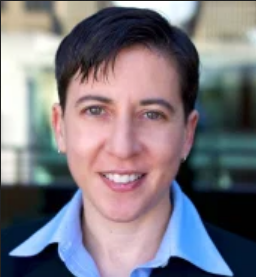
Dr. Jen Kates, Senior Vice President and Director of Global Health and HIV Policy | KFF
Dr. Jen Kates is Senior Vice President and Director of Global Health & HIV Policy at KFF, where she oversees policy analysis and research focused on the U.S. government’s role in global health and on the global and domestic HIV epidemics. She has also helped to lead KFF’s work on the COVID-19 pandemic. Dr. Kates has served on numerous federal and private sector advisory committees on global health and HIV issues including the U.S. Presidential Advisory Council on HIV/AIDS (PACHA), PEPFAR’s Scientific Advisory Board, and the Global Fund to Fight AIDS, Tuberculosis and Malaria.
Panelists:
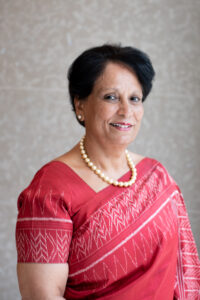
Anuradha Gupta, President, Global Immunization | Sabin Vaccine Institute
Anuradha Gupta joined Sabin Vaccine Institute as President of Global Immunization in October 2022. A veteran public health leader, Anuradha has in her previous roles spearheaded a host of successful global initiatives to improve the health of women and children and harness the full power of vaccines. Her work has created profound impact at a global scale, saving and improving millions of lives.
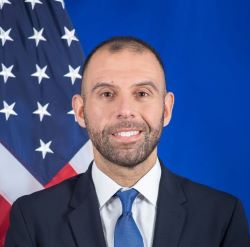
Jirair Ratevosian, DrPH, MPH, Acting Chief of Staff and Senior Advisor | PEPFAR
Jirair Ratevosian joined S/GAC in August of 2021. He is responsible for building and maintaining political relations across relevant U.S. government agencies and Department of State offices in service of PEPFAR. He is currently serving as Chief of Staff (acting), assisting Ambassador Nkengasong with strategic planning, hiring, policy development, and other front office management issues. He also serves as Chair for the PEPFAR program in South Africa. Jirair joined S/GAC as senior advisor in August 2021. He worked previously on the Biden-Harris Transition Team as policy advisor on national security, COVID-19, and global health. Prior to joining S/GAC, he led corporate social responsibility and partnership relations at Gilead Sciences, and served as legislative director to Congresswoman Barbara Lee,w here he led budget, appropriations, and the re-authorization of PEPFAR in 2013. He has worked at amfAR, Physicians for Human Rights, and served on the board of the Global Fund. In 2022, he received a doctoral degree from Johns Hopkins Bloomberg School of Public Health.
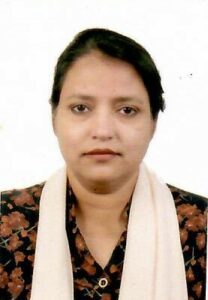
Musarrat Perveen, Regional Coordinator | CARAM Asia
Musarrat has a Masters/MSC in Clinical Psychology from the University of Sindh, Pakistan and has been working in the development sector for the last twenty years. Musarrat joined CARAM Asia in 2011, and has contributed significantly in the advancing of migrant worker’s health, HIV/AIDS, and labor rights at various levels.
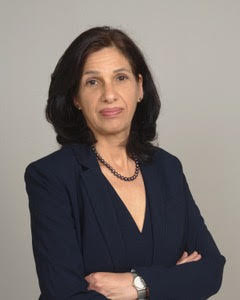
Dr. Mai Hijazi, Director, Office of Health Systems, Bureau for Global Health | USAID
Dr. Mai Hijazi is the Director of USAID’s Office of Health Systems in the Bureau for Global Health. She recently served in USAID’s Office of HIV/AIDS, as Division Chief for the Systems and Program Sustainability Division, where she led technical branches covering finance and economics, health workforce, transition to local partners and private sector approaches on advancing USAID’s role for HIV sustained epidemic control, health systems strengthening, and leadership and programmatic coordination for the PEPFAR-funded Sustainable Financing Initiative and USAID’s Local Partner Transition initiative. She joined USAID in 1997 as an American Association for the Advancement of Science (AAAS) Fellow with a Ph.D. in biomedical science and has also served as a Health Development Officer for USAID’s Office of Population and Reproductive Health.
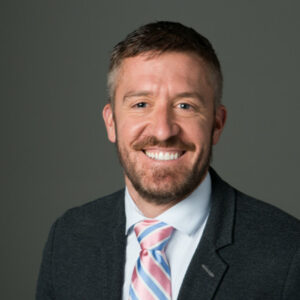
Darren Back, Vice President, Accord Strategy and Partnership Lead | Pfizer, and Executive Director | The Pfizer Foundation
Rooted in his more than two decades of global health and strategic healthcare experience, for nearly four years Darren has driven Pfizer’s enterprise strategy for global health and social impact. This includes expanding access to quality healthcare through health systems related investments, setting and leading The Pfizer Foundation’s programmatic and investment strategies, as well as directing disaster and humanitarian response. Building on his public health expertise, he is currently seconded to lead partner engagement for ‘An Accord for a Healthier World,’ a first-of-its kind initiative to expand rapid and affordable access to Pfizer’s patented medicines and vaccines available in the U.S and Europe on a not-for-profit basis in 45 lower-income countries. An expert in public health, healthcare delivery and patient access, Darren frequently works with global and national stakeholders to identify innovative partnership opportunities and ensure that Pfizer and the Pfizer Foundation’s commitments are catalytic in addressing country-specific health needs. Darren is also a Board Member of the Bay Area Global Health Alliance.
*The Pfizer Foundation is a charitable organization established by Pfizer Inc. It is a separate legal entity from Pfizer Inc., with distinct legal restrictions.